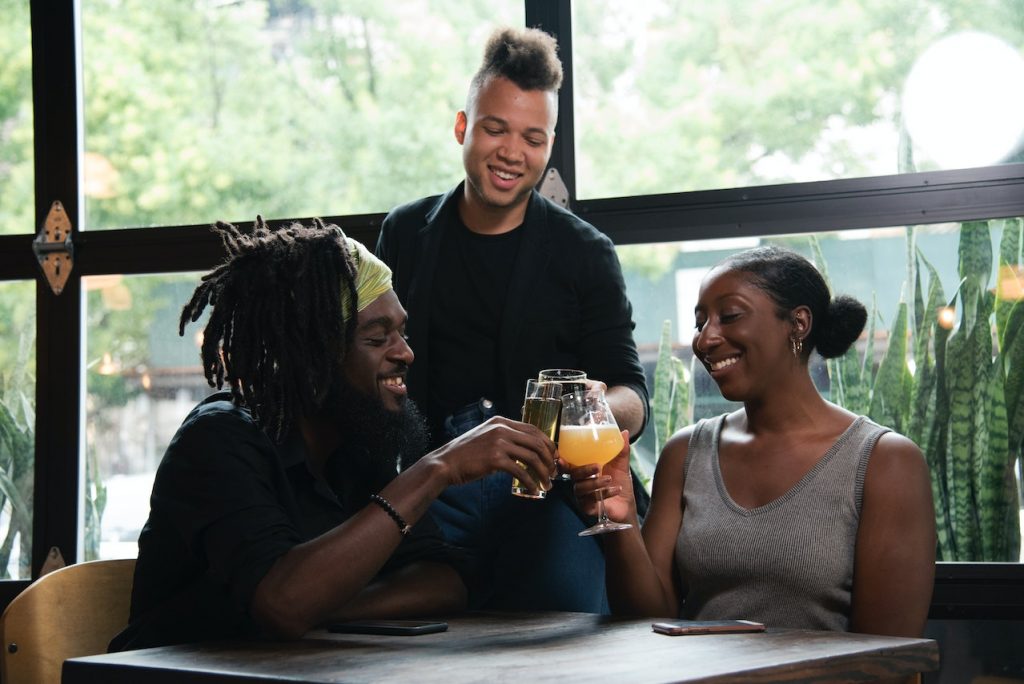Why Do People Drink Alcohol?
Do you ever find yourself wondering, “Why do people drink alcohol?”
Drinking is so common these days that it can sometimes feel like the default. And even though many people enjoy a beer or glass of wine on occasion, there are some significant downsides to dependence and heavy use. So, why do people like drinking so much—and what does the research have to say about it?
Below, discover five common reasons people drink alcohol, along with questions to ask yourself if you want to understand the motivations behind your own use.
1. To Manage Stress

In today’s fast-paced world, life is busy for just about everyone. And whether you’re a parent, taking classes, working full-time, or all of the above, it can feel like there’s never enough time to relax.
With that in mind, stress is one of the top reasons for drinking. This is because many people feel that alcohol calms down their anxiety—at least in the short term. It does this by slowing the central nervous system and creating a sense of euphoria, which can help a person forget about in-the-moment stress.
At the same time, alcohol can also act as a stressor in the body, and even cause a heightened sense of anxiety when it wears off. But despite the boomerang-like effect of alcohol on stress, it’s still common for people to grab a drink to unwind.
2. To Boost Sociability
For many, having a drink (or several) goes hand-in-hand with socializing. After all, alcohol is a favorite social lubricant—often used to combat shyness, increase openness, and offer some “liquid courage” when meeting new people.
If you’re someone who uses booze to increase sociability, you might drink to cut through the tension on dates, at parties, and in other social settings. Beyond that, you might find that the times you drink the most are when you’re surrounded by others. One study from Addictive Behaviors notes that people who use alcohol for social reasons tend to drink more when they’re around friends who are also drinking.
3. Peer Pressure
You might not always feel like drinking when you’re with friends or out socializing. However, peer pressure—or the urge to conform to the actions of those around you—is a big driver of alcohol intake, especially for teens and younger adults.
Peer pressure can also be either direct or indirect. For example, you might have a friend directly ask you to take a shot with them, or you might feel the pressure to drink simply from being immersed in a situation where everyone else is intoxicated.
So, just how strong is the influence of social pressure? One 2019 survey found that 35% of UK adults reported drinking more than they wanted to because they were “encouraged by others.” Whether it stems from staying polite or simply wanting to fit in, there’s no doubt that peer pressure is one of the biggest factors behind alcohol use.
4. Self-Medicating
Many people who ask themselves, “Why do I drink?” may be doing it as a way to self-medicate. Self-medicating means using a substance to attempt to deal with sadness, anger, or other negative emotions.
It’s also not uncommon for people with anxiety, depression, or other mental health disorders to self-soothe with substances. In fact, a 2018 review found that up to 24% of people with mood and anxiety disorders reported self-medicating at some point.
As you might guess, relying on drinking to cope can be a risky move. Even though it might bring some short-term relief, one study found that those who self-medicated with alcohol were more likely to develop alcohol dependence later on.
5. Genetics and Family History

The question “Why do people drink so much?” can sometimes be answered (at least partially) by family history. Of course, a person’s genetic background isn’t entirely responsible for their drinking patterns later in life. But research has shown that it may play a role.
There’s no single gene that can turn you into a heavy drinker, but scientists believe that alcohol and genetics can interact in complex ways. For example, having a biological parent with alcohol use disorder—even if you didn’t grow up with them—may increase your odds of developing it.
But some scientists believe that this works in the other direction, too. Alcohol use may also affect the way your genes express themselves. And sometimes, family history can impact drinking habits in ways that aren’t genetic—and it could be something as simple as repeating a parent’s behaviors.
How To Know if You’re Drinking Too Much—Or for the Wrong Reasons
If you’ve been reflecting on your own alcohol use lately, you might wonder, “How can I know if I’m drinking too much, or for the wrong reasons?”
Alcohol itself may not be a healthy substance, but that doesn’t mean it’s impossible to have a healthy relationship with drinking. With that in mind, here are a few questions you can ask yourself to evaluate your relationship with alcohol:
- Why do I drink? Are my drinking habits negatively influenced by my environment, friends, or family?
- Am I drinking more than I want to?
- Is my alcohol use impacting my life negatively? Is it affecting my job, relationship, or other areas of my life?
- Am I using alcohol to cope with trauma, sadness, anxiety, or other painful emotions? Do I think other coping mechanisms might be more helpful?
For a more complete assessment, take our alcohol use quiz.
Finding Support
If you answered “yes,” to any of the above questions, it may be a good time to consider dialing back and reevaluating your relationship with drinking. Of course, this can be tough to do on your own—but if you need some support along the way, Ria Health can help.
Ria Health is an online program that can help you improve your relationship with drinking, whether that means finding a middle ground or quitting completely. We connect you with medical professionals, anti-craving prescriptions, recovery coaching, and more to help you reach your goals. And best of all, you can access all of our support from your smartphone.
Book a call or learn more today.
Will insurance cover treatment? Verify Coverage
Have Questions? Call (800) 504-5360



